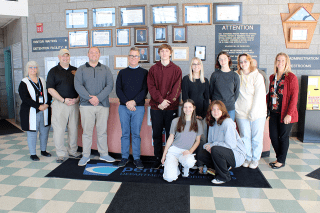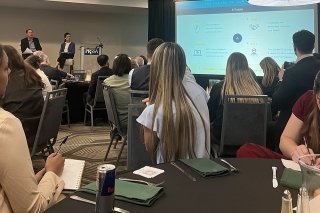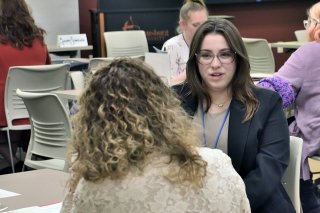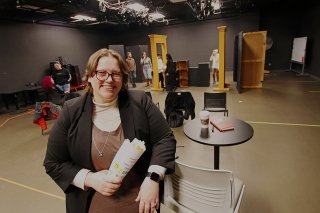Sociology class gets up-close look at prison ecosystem
Bloomsburg
Posted

This fall, a group of Commonwealth University-Bloomsburg students saw first-hand how prisons are a city within a city and the many job opportunities for the social sciences that come with it.
“Sociology students work hard, they learn to get creative and take chances,” says Brandon Lang, associate professor of sociology, who led his Introduction to Sociology class on a visit to the State Correctional Institution – Mahanoy. “Bringing them to prisons shows them that working there is another field to explore, one that is pretty good to have as an option.”
The day started with a search and screening in the main office, where students checked in to move slowly into the correctional facility. They started in the restricted housing unit and then saw people interact and work in the public visitation area. They also saw the main yards, cafeterias, and education department.
“It's important for students to see the human side of the prison system,” says Lang. “What the consequences of breaking the law are and what being in prison means. Some students are surprised at the amenities they have, but what they stand to lose if they get the few things they have taken away.”
The class then moved into the psychiatric and medical ward where they had the opportunity to speak with specialists working at SCI-Mahanoy.
“It was interesting to see mostly social workers there,” says Chelsea Hungerford, a sophomore social work major. “The intersection between psychology and social work is pretty significant. I didn’t know that before.”
Hungerford discusses the way people view prisons to be stereotypical, both for the inmates and the people working there.
“Being more educated about the prison system would be more helpful to the system as a whole,” she says. “There's a lot of empty jobs in this area. There’s not a lot of staff in prisons, and little help or rehabilitation. If we focus more on the rehabilitation part of it, we’ll have more positive outcomes for workers and inmates.”
Students then had an opportunity to talk to a panel of three inmates.
“The Q&A session was open for us to talk about anything we wanted to with them,” says Ethan Russel, a junior political science major. "Talking with the prisoners let us ask them about their incarceration and families on the outside. I have a better understanding of what I learned in class because I was able to see how crimes and prison systems affect people in real life.”
“It's important to make a classroom culture where people can talk about issues respectfully,” says Lang. “The field trips are the centerpiece. It is the big part of learning about sociology.”
Hungerford agrees.
“I feel like my visit to the prisons opens more doors,” says Hungerford. “I was very apprehensive towards the whole thing at first, but now I see how beneficial working in a jail can be. The retirement and government benefits alone should make more people look into it.”
This is not the first time the class has taken to a correctional facility, as they have the local Columbia County prison and a federal prison. After visiting local, federal, and state institutions students feel like they have a better understanding of the subjects taught in class.
“Taking a sociology class was a good opportunity for me to expand on social issues from many different perspectives,” Russel says. “It’s very fortunate for someone in my degree to be able to use knowledge from this class in my other subjects. Being able to have a conversation about social issues and come to conclusions with others is a valuable skill to have.”
Hungerford felt it was important to take this class to understand the basis of sociology and how people interact.
“Sociology is very important, especially if you don’t come from a place with a lot of diversity,” she says. "It can open your eyes you are not aware of, especially in institutions.”
“I'm very grateful for the opportunity to visit,” says Russel. “Not many people get to have this experience, I feel like if can apply my visit to studies and future job opportunities.”
Lang takes students to prisons and other institutions multiple times each semester, in all the classes he teaches. The sociology department offers interesting classes on different social settings, gender, race, social class, collecting data, and many more.



